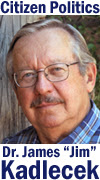“When all think alike, no one is thinking very much.” – old Czech proverb
Disagreement is usually a healthy sign in a democracy. Our system of government works best when adversaries put forth their best arguments and votes are cast to make decisions.
I know there are those who advocate for a consensus approach to public policymaking. But the reality is that, on many issues, there are two or more sides to the matter. Ultimately, our elected and appointed officials must cast their votes, and the majority decision prevails. If one assumes that officials are thinking for themselves, gathering information from multiple sources and making informed decisions, it seems unlikely that consensus and unanimity would prevail with much frequency.
However, over my many years of observing local governments, I see far too many unanimous votes at city council, county commission and other official meetings. That is a worrisome sign, in my opinion.
I also see a much too cozy relationship between professional public managers (the staff) and the elected or appointed officials. I see far too much dependence on staff recommendations. I also see a disturbing attitude on the part of elected officials toward citizen participation via input at public meetings.
Here’s what usually happens: A controversial policy issue comes before a city council or county commission. The elected body hears from staff first and last, with no limit on time. In addition, they have been provided with volumes of written material by their staff.
They may take limited public testimony. When you watch closely the body language of the elected officials during citizen input, it is apparent that most of those in the big chairs up front are paying little attention. This is usually when they get up to go to the restroom. Or they may be focusing on their laptops (playing computer games?).
In other words, they tolerate citizen input but they are paying only limited heed to it. It is given much less credence than staff testimony. Before the vote, the elected officials discuss the matter. The discussion is usually confined to elected officials and staff, and the public is not permitted to say anything.
What ought to happen
Here’s what ought to happen: A controversial policy issue comes up before city council or county commission. Staff summarizes the issue for the elected officials and is required to present both sides of the issue objectively, with no recommendation. In the packet of information given to the elected officials in advance are letters or written testimony from citizens, which has been solicited by the staff via the media. Each elected official is encouraged to invite individuals who may have information or knowledge about the matter to testify, and those persons do so (with only reasonable limits on time).
Other individuals present may also testify. If information needs to be clarified or verified, staff may be asked to do so – again, objectively, without expressing their opinions or making recommendations. Once all information has been considered, each elected official is asked to state his or her conclusions and put forth arguments for or against the issue. Now is the time for debate among the elected officials. When a reasonable time for that has past and the arguments become repetitive, the chairman or mayor calls for the vote.
Will this approach take more time, be more awkward and encourage disagreement? Yes, yes and yes. But such is the nature of a healthy democratic process. Will this approach lessen the role of professional staff? Yes, and it should. Elected officials in local governments have become far too dependent on staff to make their decisions for them. The nature of the relationship between elected officials and staff should be polite and respectful, but never friendly. If anything, it should be a bit on the adversarial side.
Elected officials are there to represent the public, not the staff, and their connection to staff should be arm’s length.
The importance of public participation
As I complete this column, I just came from a meeting of the New Mexico State University Board of Regents. The regents, while appointed officials, not elected, are nevertheless public servants who have assumed the responsibility of governing a public university. The meeting was essentially a friendly and congratulatory dialogue between staff and board members. Public input was not invited. No disagreement was evident. In my view, it was an unhealthy, staged atmosphere that stifled meaningful participation.
Common Cause was there and made a short presentation asking – again – that the regents take time at each meeting for public participation. The regents’ chair said they would “take the matter under consideration.” That’s good, but I wonder why consideration is even necessary. It should be patently obvious that a public institution, funded with public money, created by the state, governed by regents appointed by the governor, should not only allow public comment, debate and participation, but should solicit and invite it.
The university president indicated that he was a devotee of John Gardner, the founder of Common Cause. If so, perhaps he will do what he can to encourage much more openness and public involvement in regents decisions. At the moment, it appears to be a very closed system.
The rules of procedure at public meetings may not seem important to some. But I would argue that the manner in which public meetings are conducted is a basic principle of a democracy, and when procedures discourage open debate and discussion, damage is done to our system. As John F. Kennedy once said, “My experience in government is that when things are non-controversial and beautifully coordinated, there is not much going on.” Enough said.
Kadlecek has lived in

